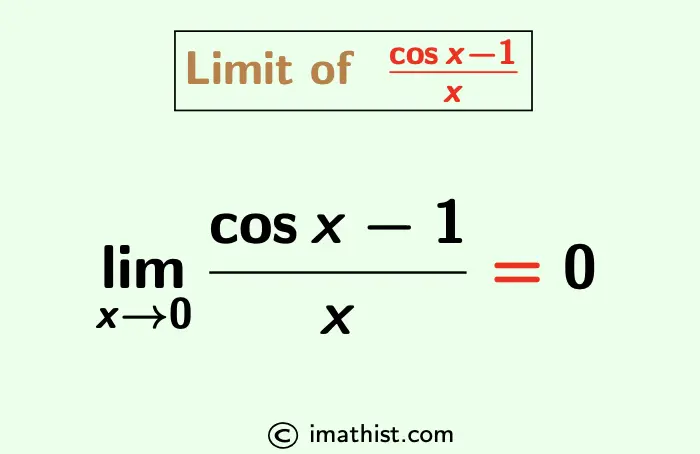The limit of (cosx-1)/x as x approaches 0 is equal to 0. Here, we will learn to find the limit of (cos(x)-1)/x when x→0. The limit formula of (cosx-1)/x as x tends to 0 is given by
limx→0

Proof of Limit of (cosx-1)/x as x approaches 0
Prove that limx→0
Proof:
The following steps have to be followed in order to find the limit of cos(x)-1 divided by x as x approaches zero.
Step 1: Multiply both the numerator and the denominator of (cosx-1)/x by cosx+1. Thus, we obtain that
limx→0
= limx→0
Step 2: Applying the formula sin2x+cos2x=1, that is, cos2x -1 = -sin2x, the above limit will be equal to
= limx→0
= – limx→0
= -1 ×
=
= 0.
So the value of the limit of (cosx-1)/x as x approaches 0 is equal to 0.
ALSO READ:
Proof of limx→0 (cosx -1)/x = 0 by L’Hôpital’s rule
Let us now prove that the limit of (c0s(x)-1)/x as x approaches to 0 is equal to 0 by L’Hôpital’s rule. See that
(c0s0-1)/0 = (1-1)/0 = 0/0, so it is an intermediate form. Hence using the L’Hôpital’s rule, we get that
limx→0
= limx→0
= limx→0
= -sin0/1
= 0/1 as the value of sin0 is 0.
= 0.
Thus the limit of (cosx-1)/x when x approaches to 0 is equal to zero, and this is obtained by the L’Hôpital’s rule.
Have You Read These Limits?
FAQs
Q1: What is the limit of cosx-1/x as x approaches 0?
Answer: The limit of cosx-1/x as x approaches 0 is equal to zero.
Q2: What is the limit formula of (cosx-1)/x as x→0?
Answer: The limit formula of (cosx-1)/x as x→0 is equal to limx→0 (cosx -1)/x = 0.